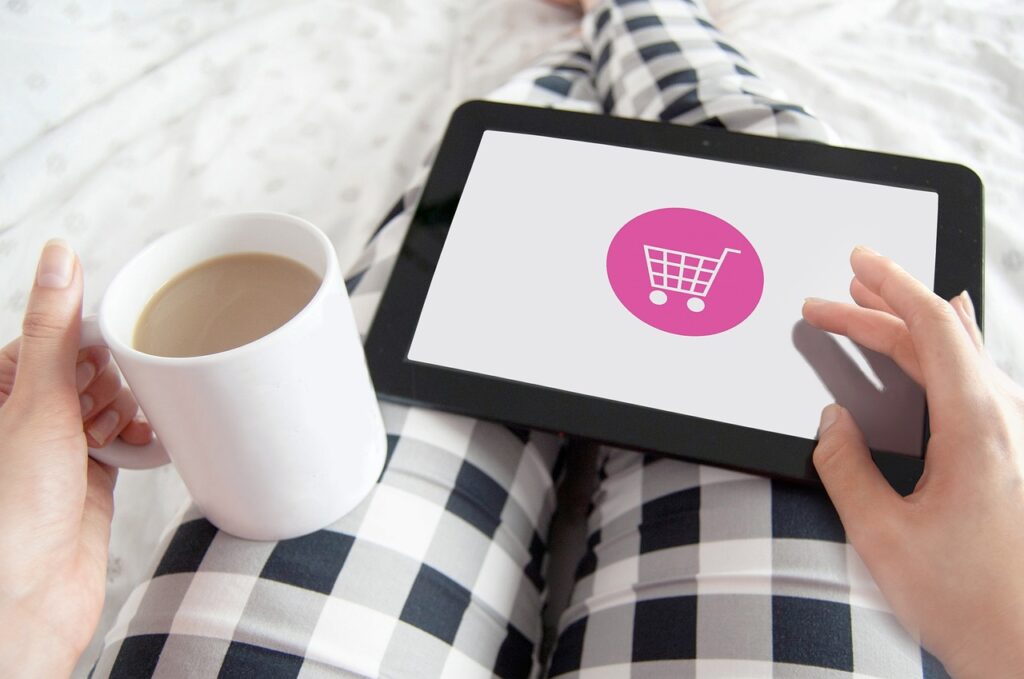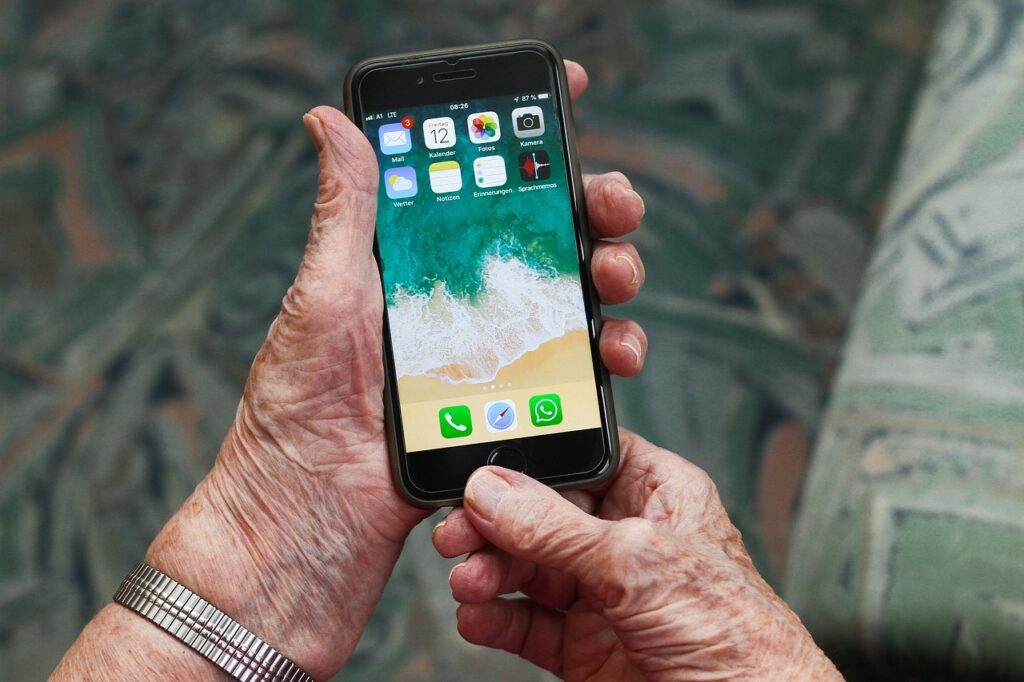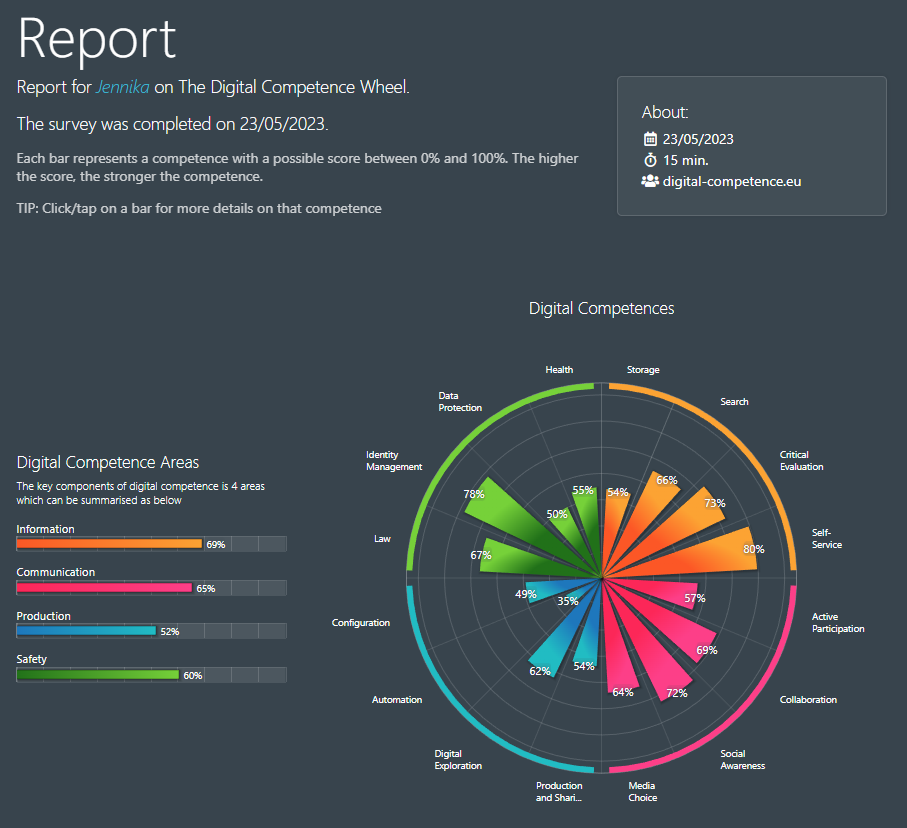Nowadays, we can do almost everything online. We can book an appointment with a doctor, a pedicure or an inspection of our car. We can also check our own information on e.g. Kela’s website, Omakanta and Keva’s website. These online services also remember what kind of pedicure we took last time, when our car needs to be inspected next and what financial support we received 20 years ago, as long as we log in to the service. We can also buy almost anything we want from anywhere in the world and have it delivered to our doorstep in a few days.

Our society is moving in the direction where digital skills play a key role in all of our lives. It is important to know and understand where our own data is stored and how we can access it ourselves. It is also important to understand how we can protect that information ourselves, e.g. with bank IDs and good passwords. Buying on the Internet is also a skill in its own right, so that our money stays safe and that we get the products and services we want and were promised. A wise consumer knows how to evaluate different sellers and online stores and the products sold in them.
I checked my own personal information in various Finnish online services, such as Kela, Omakanta and Keva. I accessed my data easily and securely with my bank credentials and mobile key. I saw my own information, from the benefits of my student days to my current health information and my future pension. I also have access to see my child’s information. It is really important that I can access this information easily and quickly, anywhere. For example, it is easy for me to check my own prescription drugs at any time.
I use quite a lot of different online stores. I support the production of my local town and Finland whenever possible. Unfortunately, not all the products I need can be found in my town of residence, or even in Finland. In online stores, the products are also usually easier and cheaper to find, when you can just google the product you want and search for the store that sells it for the cheapest price. You don’t have to wander around shopping centers for several hours. Of course, it is important to find out the reliability of the seller and the quality of the product or service when shopping online. This is where digital skills are needed! I myself use smaller specialty shops online and e.g. Amazon website in my purchases. However, now I wanted to get to know Ebay, which I haven’t used much before. Ebay is an online store where anyone can sell anything. Or at least almost. So some products have good information and some don’t. The sellers on Ebay can be private people who have only one or a few products for sale, small companies that sell their own unique products, and big companies that sell everything between the earth and the sky. Prices also vary a lot. In my opinion, we cannot judge the reliability of ebay, as a store, but we have to judge the reliability of individual sellers, which of course varies a lot from one seller to another. This time I didn’t need to buy anything from Ebay, but I think that in the future I will at least check if there are some products I want from there.

In addition to products, you can also get a wide variety of services from the Internet. You can listen to music, watch movies, go to art exhibitions or even apply for online therapy. There are also many free services in the social and health sector that are designed to be used at home. One of these services is the self-care programs of Mielenterveystalo.
In my opinion, the self-care programs of Mielenterveystalo are of really high quality and can be used in many ways. Anyone can use self-care programs, if, for example, they don’t have the time, dare or if they can’t afford to talk about things with a professional. The programs can also be used before applying for a professional or together with a professional. I myself have also recommended programs to some clients.
There are self-care programs for different age groups, from children to the elderly, and designed for different symptoms and life situations. All programs are also completely free and can be used without logging in or registering. Programs designed for children include e.g. Self-care program for children’s anxiety and Self-care program for children’s sleep problems. For young people, e.g. Self harms`s self-care program and study burnout prevention self-care program. Adults can take care of their own Binge eating or focus on the treatment of emotional locks. For the elderly, there is a Relaxation and breathing program and a Self-care program for mental well-being. There are also programs for loved ones.
Self-care programs contain information in the form of text and videos and tasks that a person can do at their own pace. The programs also provide tools that the person can use in their everyday life even after completing the program.
Nowadays, we can do almost everything online. But what if we don’t have a computer or other smart device or don’t know how to use it? When we talk about digitalization as a global phenomenon, we can easily say that we have a pretty big gap between industrialized countries and developing countries. A large proportion of the inhabitants of industrialized countries have their own computer and/or smartphone and internet connection. Even those who do not have these devices themselves have the opportunity to use the Internet in e.g. libraries. In developing countries, the situation is different. Not everyone has the opportunity to go to internet and get the information they need, e.g. related to diseases or safety, or to study remotely.
Our situation in Finland is of course much more equal in this matter than some developing countries. Almost all of us have a computer or at least a smartphone with which we can access the internet. We also have many free WIFI connections in e.g. libraries, museums and restaurants. However, we can see the digital divide between different age groups. Elderly people clearly have fewer smart devices and also less skills to use them. Our society is also constantly transferring services to the internet, where most people want to use them. However, elderly people have difficulties with these online services.

Finland has invested in older people’s use of technology and learning new techniques. Elderly people can sign up for courses where they are taught how to use smart devices and the internet, and they can get help and support for using internet services from e.g. banks. The Ministry of Social Affairs and Health has also started the National Programme on Ageing 2030 For an age-competent Finland, which also deals with the use of technology by the elderly and sets goals for the best possible utilization of technology in services for the elderly.
In all the things I mentioned above that you can do online; booking appointments, applying for benefits, checking your own information, shopping and even seeking help for anxiety, you need digital competence. Some of us have more of it and others less. It is important to understand your own weaknesses in this modern digital world, because mistakes can cost you your privacy, your property or even your life. It is important for all of us to learn to use digital services safely and also to make sure that those around us, from babies to adults, know how to use them. We’ve all probably heard stories of Nigerian princes who only need a few thousand euros transferred to their account to give a person a multi-million gift. Or about an American army officer who is head over heels in love with a Finnish pensioner, but needs money for plane tickets to get to his beloved. Or the wedding dress of your dreams, which you can order really cheap from an Asian online store.
I wanted to reflect on my own digital competence and took The Digital Competence Wheel test. I was quite satisfied with my own results, but I clearly still have room for improvement.

Sources that I used and which I recommend you to familiarize yourself with:
- https://www.mielenterveystalo.fi/fi/omahoito
- https://julkaisut.valtioneuvosto.fi/bitstream/handle/10024/162462/STM_2020_31_j.pdf?sequence=4&isAllowed=y


